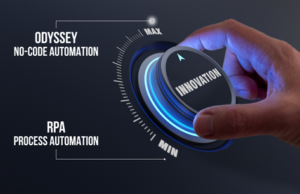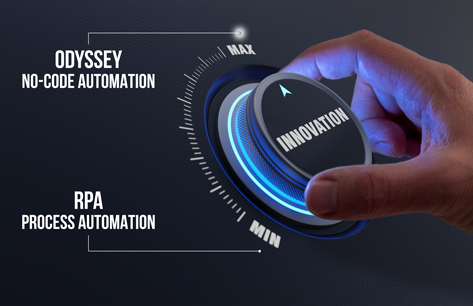 No-Code vs RPA (Robotic Process Automation) Development
No-Code vs RPA (Robotic Process Automation) Development
In today’s fast-paced business world, automation has become a necessity to keep up with the competition. There are various automation options available, including no-code automation (Odyssey) development and robotic process automation (RPA). While both approaches automate tasks and processes, they have significant differences that set them apart. In this blog post, we’ll explore 5 differences between Odyssey Automation and RPA.
Technical Knowledge Required
The most significant difference between no-code automation development and RPA is the level of technical expertise required. No-code automation development platforms are designed to enable users to create automation workflows without needing to know how to code. In contrast, RPA requires a high level of technical expertise and programming knowledge to build and deploy automation processes. This makes Odyssey Automation development more accessible and faster to implement than RPA.
Flexibility
Another significant difference between the two automation approaches is their flexibility. Development with the Odyssey platform is highly customizable and adaptable to a wide range of use cases, making Odyssey a suitable choice for businesses of all sizes and industries. In contrast, RPA is more rigid and may not be as flexible as no-code automation development when it comes to adapting to new or changing workflows.
Cost
Cost is also a crucial factor to consider when choosing between no-code automation development and RPA. No-code automation development platforms are typically less expensive to use and implement than RPA. Since no-code platforms do not require any additional hardware or software, the cost of implementation is relatively low. RPA, on the other hand, requires specialized software and hardware, which can make it a more expensive option.
Scalability
Scalability is an essential consideration when choosing an automation approach. No-code automation development platforms are highly scalable and can grow with your business needs. As your business expands, you can easily add new workflows and processes to your existing automation workflows. In contrast, RPA may not be as scalable as no-code automation development since it is built on a more rigid framework.
Security
Security is also a crucial factor to consider when choosing between developing with Odyssey no-code automation versus RPA. Since the Odyssey Digital Automation Platforms do not require any coding, it is less susceptible to security breaches. In contrast, RPA requires specialized coding, which can make it more vulnerable to security risks.
The table below contains 18 additional differences between no-code automation and robotic process automation development.
| RPA | ODYSSEY | |
|---|---|---|
| Method of Interface | Through UI of underlying applications | Direct integration with underlying data source through task agents. |
| Change impact of Underlying Application UI | If data element moves to different screen, RPA must be re-worked | None |
| Impact of change in database version | If data elements change, RPA must be reworked. | If task agent impacted, Pantheon responsible for the upgrade. |
| Who is responsible for changes to the RPA/task agent | Client | Pantheon, along with ensuring backwards compatibility |
| Time to set up the solution | Months – Years depending on the scope. | Odyssey typically can be set up in weeks to months. |
| Commercial Arrangements | Subscription paid in full at time due. | Annual subscription |
| Workflow Capability | RPA controls only that scope that it has been programmed to handle. Not a workflow tool. | Odyssey is a true workflow tool that can manage work distribution between workforces (onshore, offshore, robots) as well as exception management. |
| Programming requirements | Must have programming knowledge to build the RPA | No code. Configuration of task agents by a business analyst thereby saving costly resources. |
| Artificial Intelligence | Currently, in the roadmap. More machine learning than actual AI. | Odyssey has the ability to leverage available AI tools. Machine Learning and Natural Language Processing and some AI available in the product. |
| Multi-channel UI/report writer/exception handling tools/version control/debugging tool | N/A | Odyssey has UI, report writer, multi-channel interface, debugging tool out of the box. |
| Ability to build applications on top of the solution | No | Yes. Use cases around Contract Management, Lockbox Reconciliation, DevOps, TechOps, Cyber Security, Help Desk, Cloud, iPAAS, and DPA (BPM) are a few examples of solutions built with Odyssey. |
| Build time of individual RPAs vs. new Task agents | Depending on the complexity, and cycling through development, test and production release, 6 – 8 weeks for a simple RPA. Full end to end process requiring multiple RPAs (and robots) will take several months based on scope. | New task agents are built and certified in two weeks. |
| Scalability | TBD | The largest Odyssey client has 108,000 people accessing 124,000 applications across 36 countries. |
| Ideal target process improvement | Remedial, highly repeatable tasks, static applications and applications with no documentation. | Odyssey usage can target the full automation spectrum from the simplest of tasks to the complex, with a special ability to free previously locked down data. |
| New applications | Only partial; needs to mainly rely on applications in place. | Odyssey is an application generator |
| Security | Various issues depending on vendor | Built in state of the art 10 layered security system |
| Data Protection | Varies among vendors | Data is encrypted at rest and in transit |
| Automatic release rollback | Varies among vendors | Rollback is built in the System |
Conclusion
Both no-code automation development and RPA have their advantages and disadvantages. While no-code automation development is more accessible, flexible, cost-effective, and scalable, RPA is more robust and powerful when it comes to automating complex processes. Ultimately, the best automation approach depends on your business needs and goals. Our team is here to assist you in making the right decision for your business. We love what we do, and promise to provide you with clear information that will save you time and money. Read Part 2. Set up a no obligation quick call today.


